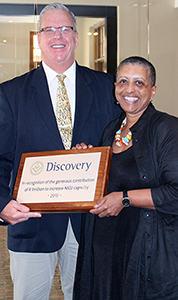Latest News Archive
Please select Category, Year, and then Month to display items
11 January 2021
|
Story André Damons
|
Photo Supplied
 Dr Ralph Clark
Dr Ralph Clark
The Afromontane Research Unit (ARU), the flagship research group of the University of the Free State (UFS) Qwaqwa Campus, has recently been granted R8,4 million to establish a Risk and Vulnerability Science Centre programme.
The Risk and Vulnerability Science Centre (RVSC) programme was established by the Department of Science and Innovation (DSI) as part of the Global Change Research Plan for South Africa and is funded by the DSI through the National Research Foundation (NRF). The RVSC will focus on the need to generate and disseminate knowledge about risk and vulnerability on global change challenges faced by local policy makers/ governance structures and communities in South Africa.
Invited to participate
Dr Ralph Clark, Director of the ARU, says the UFS, together with the University of Zululand and the Sol Plaatje University, has been invited to participate in Phase 2 of the RVSC programme. Dr Clark was approached by the DSI (on referral from the South African Environmental Observation Network – SAEON) in February 2020 regarding the potential for establishing a RVSC at the UFS Qwaqwa campus.
Subsequent interactions were held between the UFS and DSI, and in March 2020, the UFS formally accepted the DSI invitation. It has since been agreed that the RVSC: UFS will be hosted as a RVSC under the ARU umbrella, with dedicated personnel embedded at the UFS in this regard (internal processes and reporting) but reporting directly to the NRF regarding the RVSC.
Interest and support welcomed
Dr Clark welcomed this interest and support from the DSI-NRF, saying that the funds will further assist the UFS in growing its excellent and growing research portfolio and building more research capacity on this traditionally undergraduate-focused campus. “The RVSC will contribute to much-needed solutions in an area marked by major sustainability challenges and will assist in moving Phuthaditjhaba away from its negative apartheid history towards becoming a sustainable African mountain city,” says Dr Clark.
Neonatal Care Unit receives donation to expand capacity
2015-10-28
 With the best care and technology available,
the survival rate of premature
babies is about 85%. The neonatal intensive
care unit at the Universitas hospital can now
expand its capacity thanks to a donation of
R1 million by the Discovery fund.
From the left is Prof André Venter.
Head: Department of Paediatrics and
Child Health at the UFS, and mrs Ruth Lewin,
Head: Corporate Sustainability at Discovery.
|
The smallest people need the greatest care. This care is being provided by the neonatal unit in the Children’s Wing of the Universitas Hospital. This project of the University of the Free State (UFS), under the leadership of Prof Andre Venter, has led to several miracles regarding child health since its inception.
Now, thanks to a donation of R1 million rand from the Discovery fund, this unit can expand its capacity and treat more premature babies.
About 14% of babies in South Africa are born before the 37th week of pregnancy. These babies are born with a very low birth weight, and are in need of critical care. The neonatal intensive-care unit at Universitas Hospital is currently equipped to take care of about 14 premature babies at a time, from birth to discharge. However, because of the high incidence of premature births in the hospital’s service area, the unit needs about 45 beds.
The aim of the Children’s Wing Project is to expand the neonatal intensive-care unit in order to meet the demands of the hospital’s service area, which reaches as far as the Southern Cape. The Discovery Fund recently donated R1 million to the project, which will be used to expand the capacity of the neonatal intensive-care unit.
“With the best care and technology available, the survival rate of premature babies is about 85%. Without this, half of all premature babies would die,” says Prof Venter, Head: Department of Paediatrics and Child Health at the UFS.
“This is the reason why private and public partnerships, such as the one with Discovery, are essential to make specialised services available to the most vulnerable people. Discovery has made a significant contribution to the project without which we would not have been able to expand the capacity of the unit